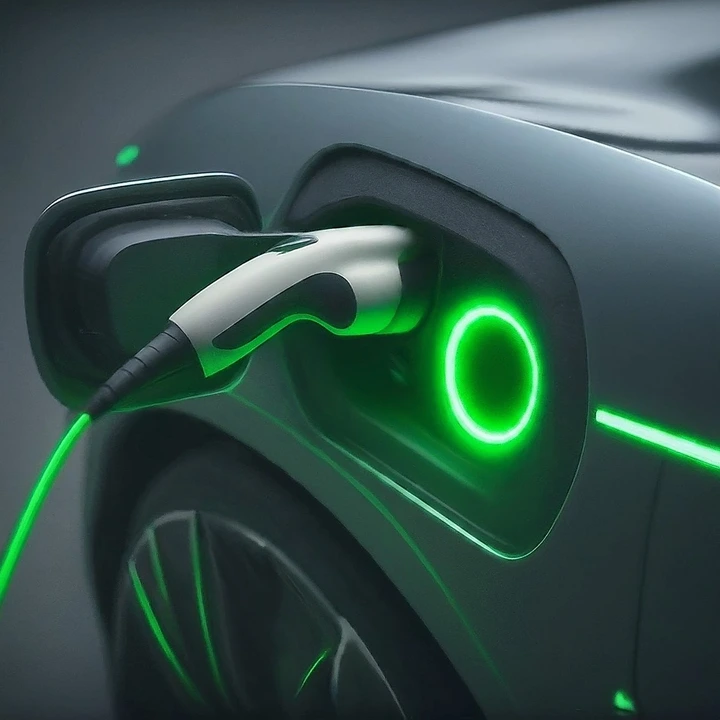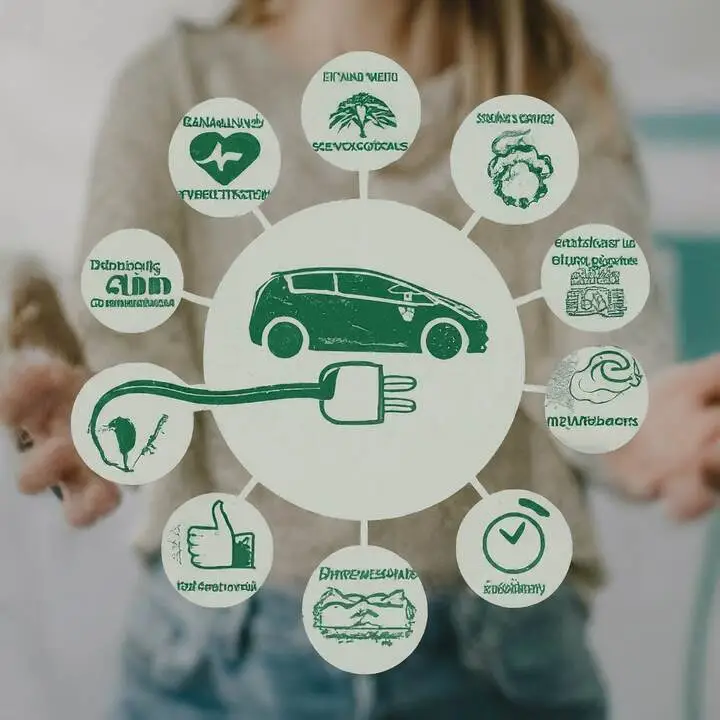With the increasing urgency of addressing climate change, the shift towards sustainable transportation has become one of the most important steps to protect our planet. Electric vehicles (EVs) are at the forefront of this transformation, providing many environmental benefits that not only reduce pollution but also contribute to the world’s long-term sustainability. Here’s a more in-depth look at the benefits of electric vehicles on the environment and why converting to EVs is a key component in building a greener future.

1. Significant Reduction in Greenhouse Gas Emissions
Electric vehicles emit far less greenhouse gas than their gasoline-powered counterparts. This is particularly important in the fight against global warming, as the transport sector is responsible for around 14% of global greenhouse gas emissions.
- EVs during operation: While driving, the EV produces zero tailpipe emissions. This means no carbon dioxide (CO2), methane (CH4), or nitrous oxide (N2O), which are major contributors to global warming. In contrast, gasoline-powered cars emit these gases continuously throughout their lifetime.
- Energy source improvements: Although the electricity used to power EVs may still come from non-renewable sources such as coal, natural gas or oil, the shift towards renewable energy sources (solar, wind and hydropower) is accelerating. As a result, the carbon footprint of EVs continues to shrink.
2. Improved Air Quality and Public Health Benefits
One of the most immediate benefits of electric vehicles to the environment is their contribution to cleaner air. Conventional vehicles emit nitrogen oxides (NOx), particulate matter (PM), and volatile organic compounds (VOCs), all of which are harmful to human health. These pollutants cause respiratory and cardiovascular diseases, leading to millions of premature deaths worldwide.
- Impact on urban air pollution: Cities with high traffic density suffer from poor air quality, resulting in smog and various health problems. With more electric vehicles on the road, cities could experience dramatic improvements in air quality, especially during peak traffic hours.
- Health benefits: Reducing air pollution reduces the risk of asthma, lung cancer, heart disease and other serious health conditions. The World Health Organization estimates that air pollution is responsible for 7 million deaths each year, and a shift to electric vehicles could significantly mitigate this public health crisis.
3. Noise Pollution Reduction
Electric vehicles operate much more quietly than traditional internal combustion engine (ICE) vehicles. Noise pollution is often overlooked as an environmental problem, but it significantly affects the quality of life, especially in urban environments. Chronic exposure to high levels of noise can lead to stress, sleep disturbances and even cardiovascular problems.
- EVs and quiet operations: Because EVs have fewer moving parts and no exhaust system, they produce minimal noise. It calms neighborhoods, cities and highways, improving the overall well-being of residents
- Impact on wildlife: In rural and natural settings, less vehicle noise also benefits wildlife. Many species rely on sound for communication and navigation, and quiet roads can reduce disruption to ecosystems.
4. Conservation of Natural Resources
Electric vehicles significantly reduce reliance on fossil fuels such as gasoline and diesel, which require energy-intensive extraction, refining and transportation processes that damage the environment.
- Oil extraction: Fossil fuel extraction leads to habitat destruction, oil spills and water source pollution. By reducing oil demand, EVs help preserve ecosystems and protect biodiversity.
- Battery recycling and advancements: The production of EV batteries, especially lithium-ion batteries, requires mining for materials such as lithium, cobalt and nickel. However, as technology advances, battery recycling is improving, and alternative materials are being explored to reduce the environmental impact of battery production.
5. Energy Efficiency
Electric vehicles are more energy-efficient than traditional gasoline-powered vehicles. This means that they use less energy to travel the same distance, reducing overall costs and waste.
- Electric motor efficiency: EVs convert more than 77% of the electrical energy from the grid to power the wheels, compared to gasoline vehicles, which only convert about 12%-30% of the energy stored in gasoline. This higher efficiency means less energy is needed for transportation, reducing overall demand.
- Regenerative braking: EVs use regenerative braking, which captures the energy normally lost during braking and uses it to recharge the battery. This further increases energy efficiency and reduces waste.

6. Supports Renewable Energy Development
The increasing popularity of electric vehicles is driving the demand for cleaner sources of electricity. As more people adopt EVs, governments and energy companies are encouraged to increase production of renewable energy such as wind, solar and hydropower.
- Renewable energy integration: EVs run on renewable energy by storing excess energy generated by solar panels or wind turbines in their batteries. This stored energy can be used to power homes or fed back into the grid during peak hours, increasing the overall efficiency of the energy system.
- Smart grid technology: The rise of electric vehicles is spurring the development of smart grid technologies, which help balance energy demand and deliver it more efficiently. Smart grids enable better management of renewable energy sources and reduce the need for fossil fuel-based power plants.
7. Reduced Dependence on Fossil Fuels
Electric vehicles reduce the world’s dependence on finite fossil fuels, which are responsible for the planet’s pollution and environmental degradation.
- Impact on global oil consumption:As more drivers switch to EVs, demand for petrol and diesel falls. This reduced demand helps slow the rate of fossil fuel depletion and reduces greenhouse gas emissions from the extraction and refining of crude oil.
- Energy security: By relying more on electricity, especially from renewable sources, countries can become more energy-independent, reducing their dependence on volatile oil markets and geopolitically unstable regions.
8. Lower Carbon Footprint Over Vehicle Lifetime
Although an electric vehicle, especially the battery, produces more CO2 than a traditional car, EVs have a much lower carbon footprint overall over their entire lifetime.
- Lifecycle analysis: Several studies have shown that, despite emissions during production, EVs emit significantly less CO2 than internal combustion engine vehicles over their lifetime. This is especially true as the electricity grid becomes greener.
- Future-proofing: With ongoing improvements in battery technology, more efficient manufacturing processes and increasing reliance on renewable energy sources, the carbon footprint of EVs will continue to decline over time.
9. Long-Term Sustainability and Cost-Effectiveness
While EVs have higher upfront costs than conventional cars, they offer long-term savings for both consumers and the environment.
- Lower maintenance costs: EVs have fewer moving parts than conventional vehicles, meaning they require less maintenance. There is no need for oil changes, fuel filters or spark plugs, which not only saves money but also reduces waste and pollution generated by vehicle maintenance.
- Charging costs vs. fuel: The cost of charging an EV is significantly less than the fuel cost of a gasoline vehicle. Over time, these savings add up, making EVs more economical and environmentally friendly.

10. Government Support and Incentives
Governments worldwide are recognizing the environmental benefits of electric vehicles and are offering a variety of incentives to encourage their adoption
- Tax credits and rebates: Many countries offer tax credits, rebates and other financial incentives to reduce the upfront cost of buying an EV. These incentives help make EVs more accessible to the general public
- Infrastructure development: Governments are investing in EV charging infrastructure, making it easier for drivers to switch to electric cars. Increased access to charging stations further supports the widespread adoption of EVs.
Conclusion: Electric Vehicles as a Cornerstone of a Sustainable Future
The environmental benefits of electric vehicles extend beyond emissions reduction. From improving air quality and reducing noise pollution to conserving natural resources and promoting renewable energy, EVs represent an important step in the transition to a sustainable future. As more people make the change, the positive environmental impact will continue to grow, paving the way for a greener, healthier planet for future generations.
FAQ
Are electric vehicles truly better for the environment than gas-powered cars?
Yes, electric vehicles (EVs) are good for the environment because they produce zero tailpipe emissions, reducing air pollution. Additionally, when charged using renewable energy sources, their overall environmental impact is much lower than traditional gas-powered vehicles.
How do electric vehicles help reduce carbon footprints?
Electric vehicles help reduce the carbon footprint by using electricity instead of gasoline or diesel, which produces fewer greenhouse gas emissions. Even in areas where electricity is generated from fossil fuels, EVs have a smaller carbon footprint than conventional vehicles.
Are the batteries in electric vehicles harmful to the environment?
Although electric vehicle batteries require certain raw materials to be mined, the overall environmental impact of EVs is lower than that of gas-powered vehicles. Efforts are underway to improve battery recycling and reduce the environmental impact of battery production over time.
How do electric vehicles contribute to cleaner cities?
Electric vehicles contribute to cleaner cities by reducing air pollution and noise pollution. With zero tailpipe emissions, they help improve urban air quality and their quiet operation contributes to a more peaceful environment in crowded areas.
Visit Our All Blogs , Read More About Green Vehicles



